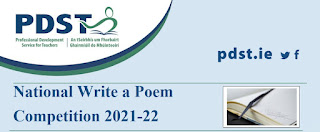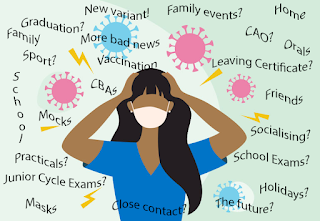Wednesday 12 January 2022
National Poetry Competition
Each entry must include: a. the Title of the Poem b. the Name of the Entrant c. the Name and Address of the School d. the Category e. Teacher Name, email address and mobile number.
Emailed entries must be sent by the teacher or school and not by the pupil.
Where an entry is inspired by or written in response to a particular poem, the name of the poem and the poet must be clearly stated on the entry and, where possible, a copy of the original poem should be attached.
The competition is aimed at individual writers. Class sets of poems will not be considered as entries for the competition. Please note that entrants should keep a copy of their poems, as poems will not be returned.
Prizes for the Writers The winning poets in each section will receive a commemorative plaque and their poem will be published on the PDST Post-Primary website and printed in the PDST National Poetry Award booklet. Prizes will be presented at an online award ceremony organised by the PDST in association with Laois Education Centre in March 2022. All entries should be emailed to margaretmary@laoisedcentre.ie
Closing date for receipt of entries is Friday 21st January 2022
How to Deal With Stress
Physical or mental stress and the emotional anxiety that often comes with it is a normal, usually temporary and a sometimes-healthy response to challenging moments or situations we all experience in life. All young people feel stressed and anxious at times, and it is very common among students in school and at examination time. However, stress and anxiety can become problematic when we become overwhelmed, and when it becomes debilitating in terms of our general sense of personal wellbeing or our ability to function effectively.
It's fair to say that the combination of the normal stressors on young people generally and in our schools specifically with the extraordinary lived-experience of COVID-19 is unprecedented in terms of its negative impact on this generation of young people. The ‘new-normal’ is actually abnormal. Many feel powerless and frustrated in the face terms of what has been lost in terms of experiences and important rites of passage and in terms of the practical disruption to what might reasonably have been expected to be their experience in the normal course of events. Worst of all is the uncertainty-not knowing how things will be-to have at least some chance to prepare for what is to come.
Coping: Managing Stress & Anxiety
How do we deal with stress and anxiety? As we begin the new school term, its timely to remind ourselves and young people to let go of the things we do not control and to focus on the things we can. Luckily, we have the power to manage our stress and anxiety. The experts generally summarise the coping strategies as: sleep well, eat well, exercise, talk about it and avoid things and situations (and sometime people!) that simply don’t help. Here’s some practical tips for managing stress and anxiety.
Everybody is unique but the following is a summary of some practical actions we can all take:
· Identify your triggers for stress and anxiety and what helps with the feelings. When and where does it happen? What increases or reduces the feelings?
· Positive self-talk: We become what we think. Anxiety is often linked to what we are thinking and those thoughts or self-talk if negative impact on our feelings and behaviour. Say stop! Write down your thoughts. Ask ‘Is it really true?’, ‘Is it helpful to be thinking this?’ and consciously choose to replace those negative thoughts with positive self-talk-for example, ‘it’s tough but it’s going to be ok’, ‘it doesn’t have to be perfect but I can try my best’, ‘I’ve managed to prepare for exams before, I can do this again’.
· Relaxation Techniques: Make time to develop the habit of relaxation. Yoga, mindfulness, deep breathing, meditation, visualisation, etc help us to do this. Here’s a nice resource to get you started https://soundcloud.com/user-719669409/relaxation-techniques-30-03-2020
· Distraction: Take time out to focus on something else. This can be done as a ‘time-out’ activity like exercise, sport, walking, reading, puzzles, gaming etc. If you find yourself in the midst of a stressful moment and/or are experiencing feelings of anxiety choose to focus on your breathing, choose to count the number of red cars passing in the background, etc.
· Extraction: While it’s important not to run away from the challenges that we all have to face, for example examinations, there are micro-extractions we can choose everyday to help make that challenge more manageable. For example, if in the company of somebody who is always negative or the conversation is increasing your feelings of anxiety about something, choose to change the topic or politely leave the conversation.
· Notice it, Name it, Shame it (Let it go): Worrying is normal but actually changes nothing-save your energy for what you need it for. Every now and then, take time to write down everything you are worried about. This will make them less scary. Now that you have written them down tell yourself that you don’t have to worry about these things at least for a while and do something else. If you need to go back to them they are there. If a new worry comes up, add it to the list and move on. Ask yourself-can I do anything about it? Yes-do it. No-move on-let it go. Refuse to give power to your worries.
· Troubleshoot (Problem Solve): This helps reduce stress and anxiety. Write down the problem you have. Write down all the possible solutions and the pros and cons of each solution. Pick the best solution and try it. Ask ‘did it work?’ If no, try the next solution. The key is to get the problem out of your head and to do something about it.
· Ask for Help! Remember for some people these tips are not enough and you might need professional help. Talk to your parent or guardian, a friend, a teacher, the school counsellor, a therapist, your GP. Help is available.
(Adapted from: National Educational Psychological Service)


